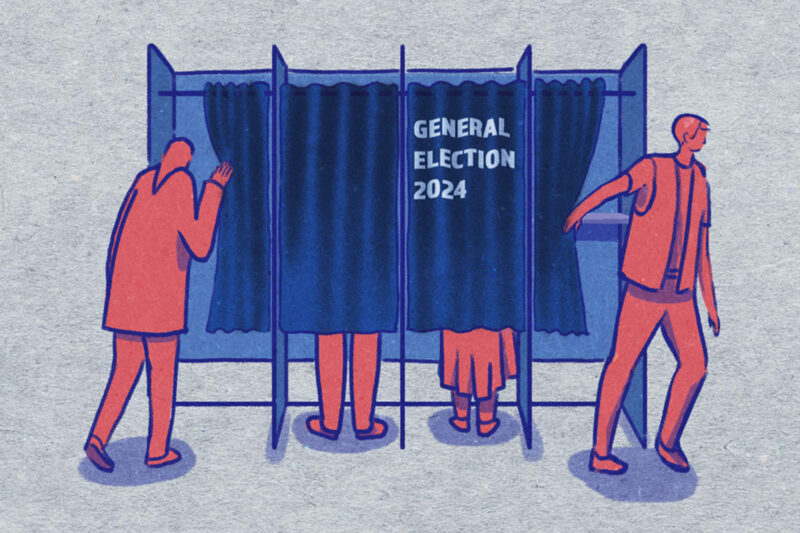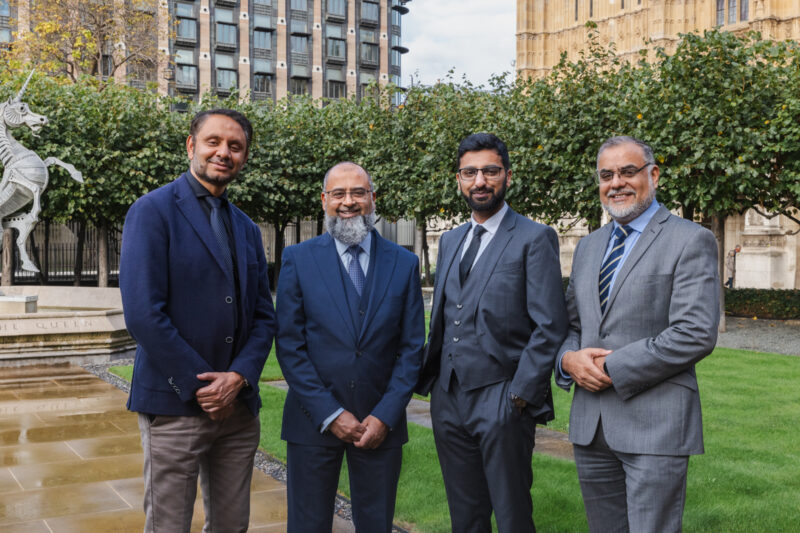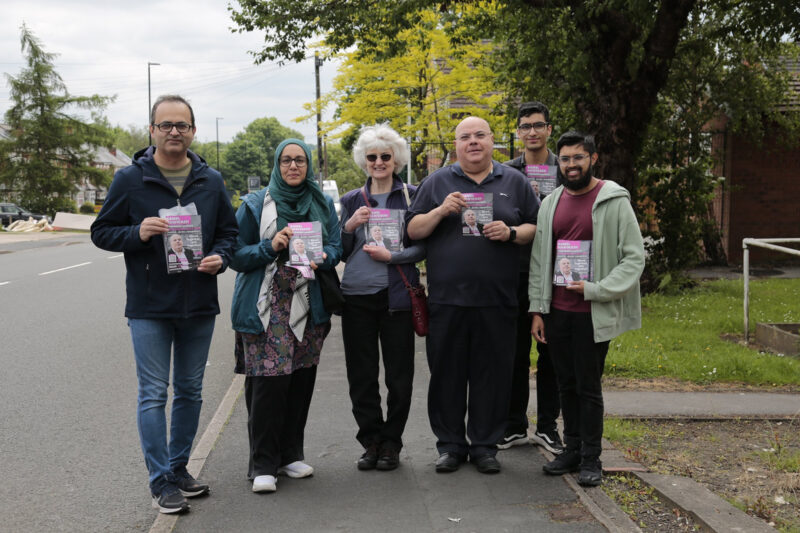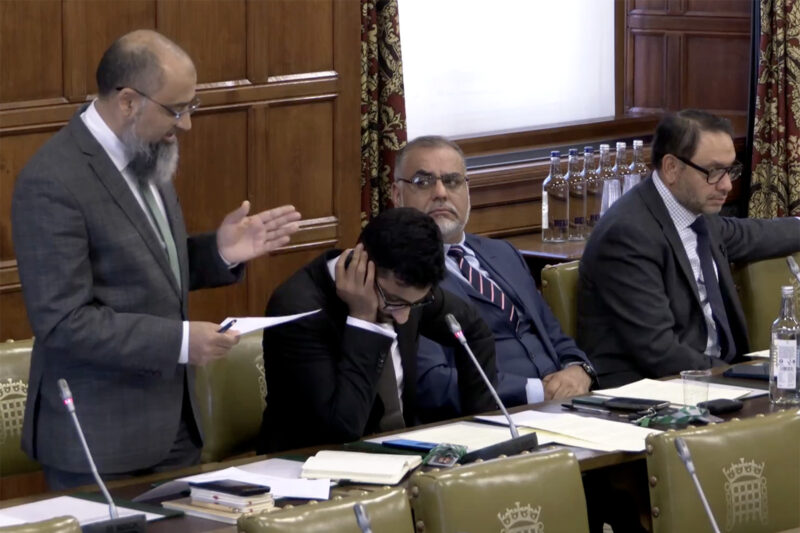Muslim voters credited for election of five independent pro-Palestinian MPs
Candidates running on a ceasefire ticket won more than 300,000 votes, forcing Keir Starmer’s party into second place in seats across the UK
–

Muslim organising and the “Gaza effect” have been credited for a record five independent parliamentary candidates beating Labour into second place on pro-Palestine tickets.
Independent winners in the UK general election include veteran Islington North MP Jeremy Corbyn, who was kicked out of the Labour party in 2020, and a string of parliamentary newcomers: optometrist Shockat Adam in Leicester South, engineer Iqbal Mohamed in Dewsbury and Batley, solicitor Adnan Hussain in Blackburn and former Liberal Democrat councillor Ayoub Khan in Birmingham Perry Barr.
Several other pro-Palestine independents ran close campaigns capitalising on dissatisfaction with Labour’s stance on Gaza, coming in second in their constituencies.
Stephen Jones, a sociologist and researcher at Keele University, told Hyphen the result was “surprising given [their] lack of a political vehicle”.
“We have seen a similar protest vote among Muslim voters in response to the Iraq war, but then the votes went to candidates from the Liberal Democrats and the Respect party,” he said. “Those were still minority parties but had an established base.”
Exclusive polling by Savanta for Hyphen ahead of the election had found that 44% of Muslim voters ranked Israel’s war on Gaza among their top five issues — and that, of those, the vast majority were open to voting independent if they had the option.
The same poll found that 12% of non-Muslims ranked Gaza in their top five issues, but again that the majority of those would consider voting for an independent candidate.
All of the five pro-Palestine independent MPs had been endorsed by The Muslim Vote, a pressure group established in December 2023 in response to the war in Palestine. The group backed more than 150 candidates overall, some in what had been considered safe Labour seats — such as Leanne Mohamad, who lost to former shadow health secretary Wes Streeting by only 528 votes in Ilford North.
The Muslim Vote had also endorsed successful candidates from the Green party, as well as candidates from the Liberal Democrats and Workers Party of Britain — including George Galloway — who lost.
“Labour, or any other political party, can no longer take Muslim voters for granted,” said a spokesperson for The Muslim Vote. “Keir Starmer needs to ensure his government is one that advocates for all, including the weakest in society, and acknowledges the challenges the party faces in winning back trust.”
Corbyn called the result “a warning to the incoming government that dissent cannot be crushed without consequences”, while Adnan Hussain told supporters: “We are here on the back of a genocide and if that’s giving us the opportunity to unite our communities then we must grasp it.”
In the London seat of Holborn and St Pancras, Starmer’s own share of the vote decreased by more than 17% compared with the 2019 election to 48.9%, while independent candidate Andrew Feinstein came second with 18.9%.
The invasion of Gaza has caused a “democratic deficit”, Jones said. “If you look at polling, there’s been a majority in favour of a ceasefire from very early on in the conflict, but this has not been reflected by the mainstream parties.
“The Labour party very gradually came around to the idea of a ceasefire, but has not pushed the idea hard.”
In Bradford East, a constituency that is 43.8% Muslim, Labour’s Imran Hussain saw his share of the vote drop by more than 25 percentage points.
Independent runner-up Talat Sajawal, who secured more than 21% of the vote, said he was “disappointed” by the result, but told Hyphen: “We will continue our fight even though the Labour party has come into power.”
Shakeel Afsar, an independent candidate who lost to Labour’s Tahir Ali in Birmingham Hall Green and Moseley, said he was “not disappointed at all” having seen his opponent’s share of the vote plummet by 35%.
Afsar’s campaign was marred by controversy after he appeared alongside fellow independent candidate Akhmed Yakoob on a podcast where Yakoob made misogynistic comments for which he was later forced to apologise.
“We are even more motivated now,” said Afsar of the result. “We’re going to carry on — there’s no stopping us now. I’m thinking I’m going to have a couple hours of sleep and then get back out there.”
In the 50 constituencies with the biggest Muslim populations where independent candidates stood, they secured more than 329,000 votes.
“This is clearly a Gaza effect,” said Paul Bickley, director of political programme at the thinktank Theos, which researches religion and politics. “Labour has been perceived as the natural home for Muslims for a long time, but perhaps this will now change.
“Muslim voters have seen that not only they can complain and protest and disaffiliate — for example, when Labour councillors left and became independent — but they can actually see independents elected to parliament as well.”
Starmer appeared to address Labour’s loss of support from some communities in his first speech as prime minister on Friday afternoon. “Whether you voted Labour or not — in fact, especially if you have not voted Labour — I say directly to you: my government will serve you,” he told crowds in Downing Street.
 Newsletter
Newsletter












